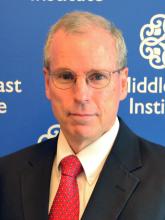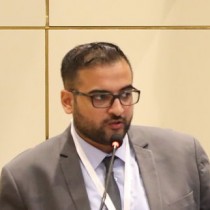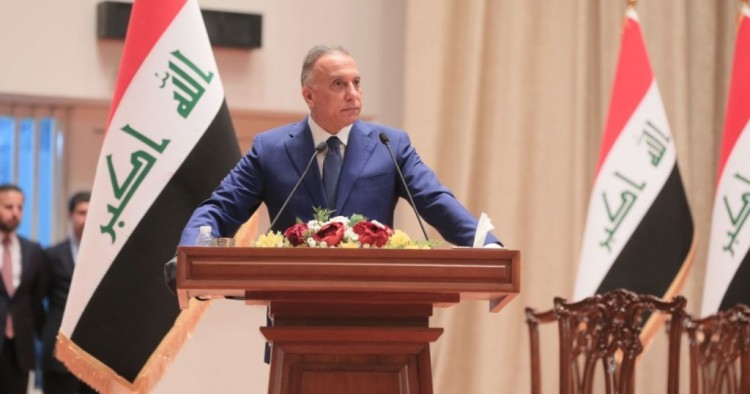[Note: For analysis on the Israel-UAE deal, please see our separate special briefing on regional reactions, featuring perspectives of seven MEI scholars.]
This week's briefing on recent news and upcoming events in the region featuring Robert S. Ford, Paul Salem, Yesar Al-Maleki, and Marvin G. Weinbaum.
Iraqi PM heads to Washington for high-level talks
Robert S. Ford
Senior Fellow

Iraqi Foreign Minister Fuad Hussein is in Washington to prepare for Prime Minister Mustafa al-Kadhimi’s Thursday meeting with President Donald Trump and other senior American officials. Hussein brought an economic team, as the Iraqi government seeks Washington’s help for the wobbly Iraqi economy. Protests in Iraq over poor provision of essential services, especially electricity, and the expiration in three weeks of the American sanctions waiver on Iraqi imports of Iran gas and electricity add urgency to the Iraqi government’s hope to develop a collaborative plan with the U.S. Meanwhile, President Trump will press for commercial deals, especially in the energy sector, and these could form part of a way forward that also provides for another sanctions extension. Al-Kadhimi likewise hopes to secure more American support for Iraq’s health sector, which is struggling to cope with the expanding virus pandemic.
Al-Kadhimi met over the weekend with Iraq politicians where he again heard demands from some of the Shi’a Islamist factions that the Americans start withdrawing their remaining troops. The American side has indicated a willingness to draw down some of its forces, although it hopes to keep a small force in Iraq in the long term to train and assist Iraqi security units. Some militant Shi’a fighters continue to launch small rocket attacks on the International Zone and bases where the U.S. Embassy and U.S. military forces are located, and the U.S. side will reiterate that al-Kadhimi must keep pressuring those militants. One often well-informed Iraqi politician reported al-Kadhimi met with Iranian Gen. Esmail Ghaani, head of the Islamic Revolutionary Guard Corps - Quds Force, on Sunday, a reminder that al-Kadhimi has to navigate between Tehran and Washington. CENTCOM Commander Gen. Kenneth McKenzie is urging Washington to give the Iraqi prime minister “room and patience” to improve the security climate. If the two governments agree on the role of U.S. forces over the next year and a plan for economic cooperation, including on how to address Iraqi imports of Iranian energy and grow Iraq’s domestic production, the visit will be successful.
Lebanon seethes amid crimes
Paul Salem
President

The criminal blast of Aug. 4, which killed hundreds, wounded thousands, and devastated large parts of the Lebanese capital, should prove as much of a pivot point in Lebanese politics and history as the assassination of former Prime Minister Rafik Hariri in a more concentrated blast in February 2005. Almost two weeks after the devastating port explosion, the international community, led by French President Emmanuel Macron, has shown empathy and leadership, while Hezbollah and the oligarchy that it controls remain in hiding and are focused on deflecting blame from themselves and resisting any meaningful change.
And tomorrow, Aug. 18, the Special Tribunal for Lebanon will issue its long-awaited judgement regarding the perpetrators of the 2005 assassination. It is likely to confirm what it alleged earlier when it accused a number of Hezbollah operatives of involvement; attention will be focused on whether the final judgement will go beyond those individuals to impugn the organization or any outside powers. The long- awaited verdict will inflame Sunni-Shii tensions that are already at the breaking point in Lebanon. Both the victim’s son, Saad Hariri, and Hezbollah have urged their followers to show “restraint.”
The main political outcome of the port blast might be the collapse of Gebran Bassil’s attempts to extend the Aounist movement beyond the flickering life of his aging father-in-law, President Michel Aoun, and with it the Aounist-Hezbollah alliance that began in 2005. Hezbollah’s claims that it knew nothing about the existence of 2,750 tons of explosive ammonium nitrate in a strategic port that it used regularly has added inflaming insult to the enormous injury among many Lebanese. Hezbollah lost the support of most of the Sunni community after the assassination of Rafik Hariri in 2005, and again in the carnage of the Syrian civil war; with this blast, it has become widely and viscerally reviled in much of the Christian community as well, which was particularly hard hit.
In Lebanon the coming weeks and months stretch out along two pathways. The effort to mourn the dead, heal the wounded, and work quickly to repair and rebuild the devastated parts of the city is under way. Lebanese civil society has burst into a flurry of solidarity and action, and the international community is moving quickly to provide much needed support. The damaged parts of the city might be subdivided into sectors where various international donors can engage directly with local actors, thus bypassing a corrupt and ineffective government structure.
On the political track, the government of Hassan Diab resigned after the blast and remains in a caretaker capacity. Meetings have begun among the oligarchy to negotiate the outlines of a new government. Civil society groups are insisting on an independent government of capable non-partisan professionals to be put in place and granted special legislative powers by Parliament in order to quickly and effectively implement needed reforms and engage in negotiations with the IMF. Hezbollah and Amal have rejected this approach, and insist on a government that reflects the majority that they and their allies enjoy in Parliament.
They would like Saad Hariri to return to the fold and head a new government, but he is reluctant to do so if his government is to be saddled with the same veto-wielding groups that paralyzed his last government. Also, the widespread protest movement would not take kindly to his return as prime minister at this point. Two options among the oligarchy include finding yet another subservient government of affiliated technocrats to assume the mantle for the coming months, or maintaining the caretaker government for now, and awaiting the outcome of the U.S. elections in November before beginning a real negotiation with domestic, regional, and international players on the outlines of the upcoming era in Lebanon. The mood inside the country has decisively changed, the Aounist movement is mortally wounded, and Hezbollah is on the back foot. Internationally, the U.S. election could bring about new dynamics in the region, especially if Washington resumes links with Tehran. And meanwhile, the UAE-Israel normalization agreement and the string of regional changes it could bring about is dramatically reshuffling the regional deck.
What is clear to many is that the return to the status quo ante, with Hezbollah dominating the port, the airport, and violating the country’s sovereignty, borders, laws, tariffs, and regulations at every point, while also propping up a criminally corrupt political oligarchy and dominating the presidency, the government, and the Parliament, is not acceptable. How to move the country forward toward increased sovereignty and better governance, and toward more public voice and accountability, without also sparking instability and the risk of civil war, is the challenge for everyone in the critical weeks and months ahead.
When it comes to Baghdad, Washington has to look beyond security and regional dynamics
Yesar Al-Maleki
Non-resident Scholar

Cautiously and carefully, Prime Minister Mustafa al-Kadhimi’s government has successfully passed its 100-day test — a decade-old tradition for Iraqi leaders where they are expected to improve services in an impossibly short time frame. Al-Kadhimi was pushed to the helm following what has effectively become the first major grassroots popular uprising in Iraq after democratization in 2003 — an uprising that toppled his predecessor, Adel Abdul-Mahdi.
Surprising established political elites and pundits alike, the prime minister’s decision to set June 2021 as a tentative date for elections has caught the political order off guard. This has spurred activity among Baghdad’s political headhunters; they are seeking young, educated, energetic, and ambitious fresh blood to inject into existing or new political or even apolitical organizations. This creates an opening to sow the seeds of change, if the opportunity is properly utilized.
Iraq’s delegation is set to arrive in Washington for talks this week after nearly a year of political, economic, and social turmoil back home. Jobless and hopeless, young Iraqis took to the streets last fall demanding change — a change they themselves seem not to have fully fathomed the intricacies of yet. Put simply, it has become a pure, maybe even naïve, aspiration for a nation without elitism, corruption, and nepotism. Despite being a promising platform for many old and new faces, the movement is still weak as a vehicle for long-sought reform — a reform that revolves around a fundamental shift in the collective view of Iraq’s political economy away from rentierism.
As life slowly goes back to “normal” in Baghdad, Iraq faces a heavy economic and social burden. Efforts to remedy the impact of lower oil prices and the COVID-19 pandemic will add $18 billion in public debt. The first half of 2020 was cruel: 4.5 million Iraqis are expected to be pushed below poverty and 42 percent of the population has become vulnerable. With deteriorating health, living conditions, and financial security, the poverty rate is expected to reach 31.7 percent in 2020, up from 20 percent in 2018. These trends will only exacerbate economic and social upheaval in the years to come as an era of low oil prices dawns.
Many Iraqis are anticipating a promised white paper that could bring long overdue economic reform. It is expected to include efforts to support the private sector, remove barriers to foreign investment, and empower job creation and small and medium-sized enterprises. However, as this government and Parliament are transitional, the hope is for those coming next to create a medium-term national development program based on this white paper. But will it find those who champion it?
Many may shy away from asserting the obvious in writing: This government has de facto been branded America’s in Iraq. Washington has to seriously consider its longevity beyond the next elections by viewing it beyond the scope of security, short-sighted regional interests, and the narrow prism of the “maximum pressure” campaign on Tehran.
The White House is in position to encourage multilateral financial organizations, Gulf allies, and the American business community to extend various measures of support: loans, stimulus packages, and investments. Of course, there would be compromises and regional political alignments required from Baghdad. This trip will determine if the eventual success of this government trumps all other immediate expectations in Washington. With America officially entering elections season in the run-up to November, the question remains: Will it be instant or delayed gratification in Washington?
Afghanistan: The enormous risk for peace
Marvin G. Weinbaum
Director for Afghanistan and Pakistan Studies

The last impediment to convening intra-Afghan peace talks was presumably removed last week with an agreement on the release of approximately 400 Taliban prisoners, among them many responsible for particularly violent crimes. After weeks of resisting freeing them, President Ashraf Ghani had found himself in a bind. With the fate of the talks on the line and facing domestic and international communities impatient for negotiations to begin, Ghani knew he needed to find a way to back off. With deft political maneuvering he convened a Loya Jirgah, providing a way to reverse himself without overtly appearing to do so. By sanctioning a prisoner release, the traditional assemblage dutifully gave Ghani the cover he needed to yield to the Taliban demand. Understandably still on the defensive, Ghani publicly admits to his taking “a risk for peace.”
The most recent concession to the Taliban has set a dangerous precedent, one likely to haunt the upcoming meetings in Doha. President Ghani had at first rejected the prisoner swap negotiated by the U.S. and Taliban alone. To get talks started he initially agreed to release just 1,500 of the 5,000 prisoners called for in the February agreement. The number freed grew afterwards but Ghani seemed to have drawn the line on releasing those prisoners accused of the worst terrorist acts. With that line now crossed, the Taliban has full confirmation that it need only wait out the government side to have its way. This knowledge undercuts any among the Taliban’s leadership who might have been willing to entertain some compromise in the forthcoming talks. It also ensures maximalist Taliban demands at the table at both the opening and closing of the peace negotiations.
Yet according to Ghani, the upcoming discussions in Doha herald new momentum for a political solution that will preserve the gains made since 2001, including a democratic Afghanistan. To strengthen his delegation’s hand in the talks, he is counting on international partners to stand firm with the government and on unity among Afghanistan’s political leaders. In point of fact, the Taliban has never been swayed by international pressure, and rival Abdullah Abdullah seems as occupied fighting with Ghani over cabinet selections as with leading the government peace delegation. While the Taliban has assembled a united, disciplined team for Doha, the Afghan delegation is an amalgam of varying interests and agendas.
The Afghan government delegation will arrive in Doha for intra-Afghan talks holding a weak negotiating hand. The U.S. had relentlessly pressured the Ghani government to fulfill the terms of an agreement with the Taliban it had no part in negotiating. The potentially strongest card against the Taliban was traded away some time ago when the Trump administration made clear its intention to pull out its forces regardless of progress toward peace. This was formalized with the February agreement, which also exposed the dangers in diplomacy with the Talban. Anxious that nothing happen to upset its withdrawal plans, the U.S. has minimized blatant Taliban violations of two key provisions of the deal — failure to cut ties with al-Qaeda and promises privately given to sharply cut back on violence. Plainly, the dividends Ghani is hoping for with talks come with enormous risks and also some illusions.
This article was co-authored by Hamid Safi, Sawera Khan, and Jack Stewart, research assistants to Marvin G. Weinbaum.
Photo by Iraqi Parliament / Handout/Anadolu Agency via Getty Images
The Middle East Institute (MEI) is an independent, non-partisan, non-for-profit, educational organization. It does not engage in advocacy and its scholars’ opinions are their own. MEI welcomes financial donations, but retains sole editorial control over its work and its publications reflect only the authors’ views. For a listing of MEI donors, please click here.













